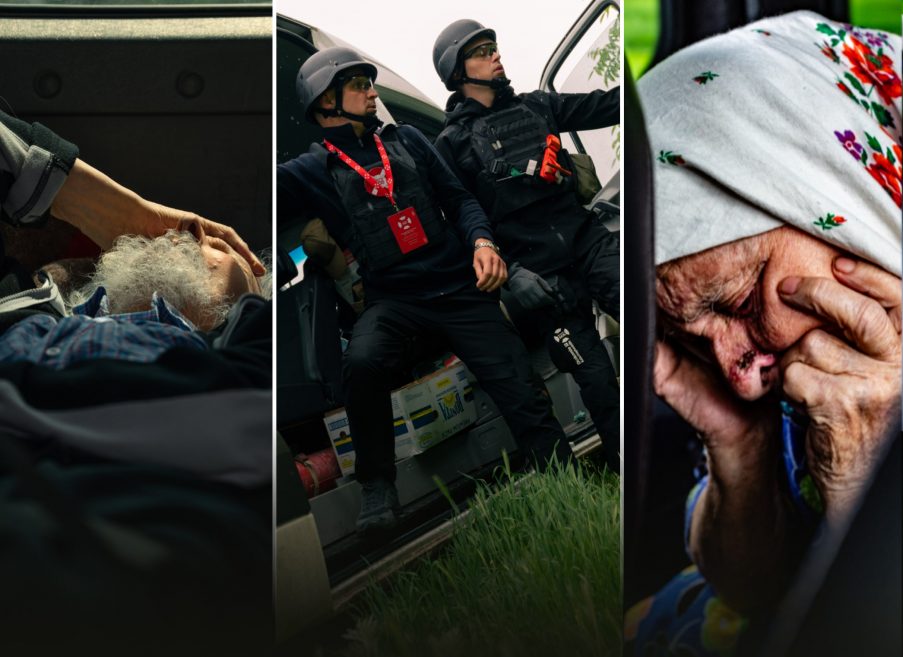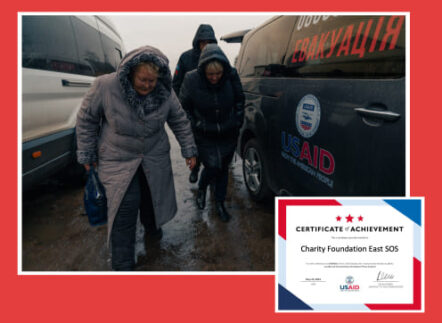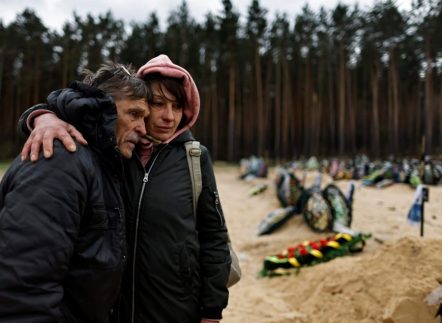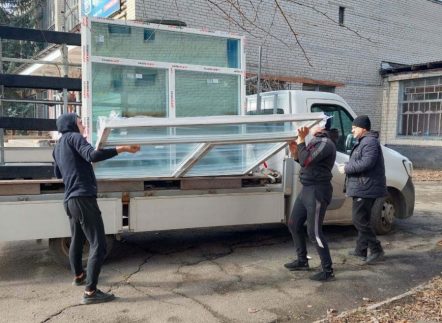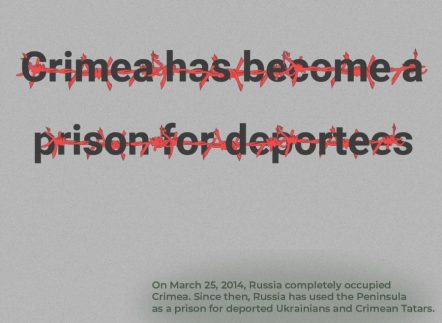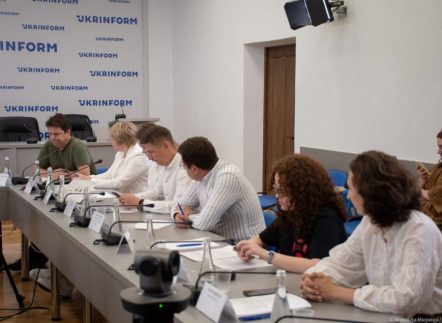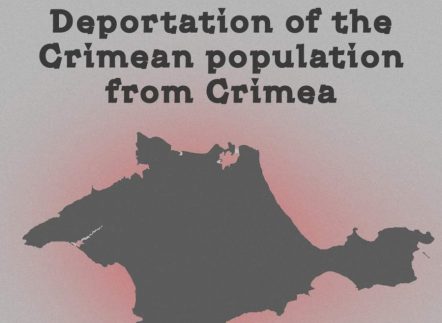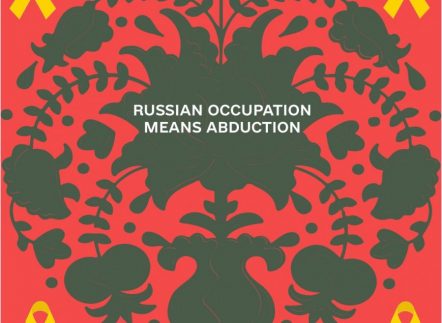Written by: Mariia Panchenko
Project team: Olha Opalenko, Mykyta Biliakov, Nataliia Kaplun, Inna Krat, Oleksandr Leonov, Pavlo Shvab
- The context of human rights violations in the occupied territories of Ukraine.
On February 24, 2022, the armed forces of the Russian Federation carried out a full-scale invasion of Ukraine, which was a continuation and escalation of the international armed conflict that has been going on between Russia and Ukraine since 2014. As a result of the new intensified attack, in addition to the previously occupied regions of Crimea and parts of the Donetsk and Luhansk regions, Russia managed to occupy other territories of Ukraine, including parts of the Kyiv, Chernihiv, Sumy, Kharkiv, Zaporizhzhia, Kherson, Mykolaiv regions and some settlements in the Donetsk and Luhansk regions that had not been occupied before. During the hostilities, the Ukrainian armed forces liberated Kyiv, Chernihiv, Sumy, Mykolaiv, part of the Kherson, and almost all of the Kharkiv regions; other territories are still under Russian occupation.
- Human Rights during armed conflict and international legal obligations of the Russian Federation
During an armed conflict, the legal regime of international humanitarian law (hereinafter referred to as IHL) applies. It defines the rules of war and, among other things, the rules of treatment of protected categories of persons, including the civilian population of the occupied territories. During an armed conflict, IHL, as a lex specialis, prevails over international human rights law (hereinafter – IHRL). However, the IHRL regime mustn’t cease to operate. It is applied in parallel to IHL and continues to protect individuals from abuse or arbitrary exercise of power by state representatives even during the war, although with some limitations.
According to the principle of extraterritorial jurisdiction, a state is responsible for human rights violations by its representatives in any territory over which it has effective control, even if that territory is outside its internationally recognized national borders. Thus, Russia is responsible for human rights violations by its representatives in the occupied territories of Ukraine.
Most recently, Russia was a party to the European Convention on Human Rights of 1950 (hereinafter referred to as the ECHR or the Convention) and thus was subject to the jurisdiction of the ECtHR, which, according to the ECHR, is empowered to consider individual and inter-state applications alleging human rights violations by a State party. However, the Russian Federation withdrew from the Council of Europe on March 16, 2022, and ceased to be a party to the Convention. After September 16, 2022, the ECHR no longer has the legal authority to hold Russia accountable for human rights violations. In other words, Russia has de facto ceased to be part of the European human rights protection system, which has created a legal vacuum: Russian representatives continue to commit human rights violations, but there are no longer any tools to bring them to justice.
However, this does not exempt Russia from its obligations under the IHRL. Firstly, human rights are universally recognized as jus cogens and erga omnes norms, which makes them part of customary international law. In other words, they are universal and binding on any member of the international community, regardless of the presence or absence of obligations under treaty law. Secondly, Russia also has treaty obligations in the field of human rights, as it is a party to the Universal Declaration of Human Rights of 1948 and a party to the vast majority of the main UN conventions protecting human rights, in particular, the following:
- The International Covenant on Civil and Political Rights of 1966 (hereinafter – the ICCPR);
- The International Covenant on Economic, Social and Cultural Rights of 1966;
- The International Convention on the Elimination of All Forms of Racial Discrimination of 1965;
- The Convention on the Elimination of All Forms of Discrimination against Women of 1979;
- The Convention against Torture and Other Cruel, Inhuman or Degrading Treatment or Punishment of 1984;
- The Convention on the Rights of the Child of 1989;
- Convention on the Rights of Persons with Disabilities, 2006.
To implement each of these international documents, a UN treaty-based quasi-judicial body was established to record violations of the rights of persons under the jurisdiction of a state party. Although the decisions of these bodies are advisory and inferior to the force of ECHR judgments, they can be one of the levers of influence on Russia.
Despite its numerous human rights obligations, during the more than nine years of the armed conflict – and especially after February 24, 2022 – there has not been a single rule or prohibition of the IHRL and IHL that Russia has not violated, demonstrating a blatant disregard and complete disrespect for the international legal order and international law.
- Human rights violations in the occupied territories in February 2023
The parts of Ukraine occupied by the Russian Federation remain restricted from access by national and international institutions and organizations studying human rights. Under such conditions, data from social networks, media, etc., is a valuable source of information about everything that happens in these territories.
For a long time, Vostok SOS experts have been monitoring open sources and, based on the information collected, recording human rights violations committed by representatives of the Russian Federation in the occupied territories and publishing monthly reports on the violations.
This report provides an overview of human rights violations committed in the occupied territories of Ukraine in February 2023.
It is important that since the spring of 2022, the number of such violations has not decreased, and the occupying power has not shown any positive dynamics concerning human rights. Representatives of the Russian Federation and its occupation administrations continue to abuse power in the territories of Ukraine temporarily under their control, humiliating the dignity and causing significant harm to the health and well-being of civilians.
The data collected and presented in this report does not claim to be comprehensive and represents only a small percentage of all human rights violations committed in the occupied territories.
- Number and types of human rights violations
In February 2023, Vostok SOS monitors identified 94 cases of human rights violations in the occupied regions of Ukraine. Most violations were recorded in the Zaporizhzhia region – 38 and the Kherson region – 28. In other regions, the numbers are lower: Luhansk region – 19 cases; Crimea – 7; Donetsk region – 2.
The property right was violated most often this month – 58 cases, including 20 in the Kherson region; 20 in the Zaporizhzhia region; 16 in the Luhansk region; and one case each in the Donetsk region and Crimea. These figures reflect isolated acts of destruction or misappropriation of civilian property. At the same time, in February 2023, in the city of Mariupol, Donetsk region, the occupation administration destroyed entire buildings and even neighborhoods, constituting a massive violation of the right to property.
Other common types of violations in the occupied territories in February 2023 include the following:
- the right to liberty and security of person – 14 such cases were recorded in February: 7 – in the Zaporizhzhia region; 3 – in the Kherson region and Crimea, and 1 case in the Luhansk region;
- prohibition of torture – a total of 10 cases: 5 – in the Zaporizhzhia region; 2 – in the Kherson region and Crimea, and 1 case in the Donetsk region;
- right to life – 6 cases: 3 in the Kherson region; 2 in the Luhansk region; 1 in the Autonomous Republic of Crimea;
- prohibition of slavery and forced labor – 4 cases in the Zaporizhzhia region;
- freedom of thought, conscience, and religion – 2 cases in the Zaporizhzhia region.
- Examples of human rights violations in the occupied territories
The property right
The most widespread human rights violation in the occupied territories in February 2023 was the violation of the right to property. The Russian military, representatives of the local occupation administrations, and members of the L/DPR paramilitary groups systematically misappropriated or destroyed residents’ property.
In February 2023, most such cases were recorded in the Kherson and Zaporizhzhia regions. First, local residents complain about the arbitrary appropriation of their property. In particular, in the village of Verkhnii Rohachyk and the village of Tavriiske in the Kherson region, Russian military personnel have illegally moved into civilian apartments and houses and are using their property. In the cities of Berdiansk, Melitopol, and Enerhodar in the Zaporizhzhia region, Russian military personnel, including Kadyrov’s men, are breaking into garages, damaging and looting civilian property under the pretext of fighting partisans.
The local occupation authorities have also begun to implement a systematic policy of “nationalizing” the property of residents of the occupied territories. For example, in the villages of Brylivka and Novokyivka in the Kherson region, Russian military personnel went door-to-door and checked citizens for residence permits and housing ownership documents. Abandoned houses were sealed, and notices were affixed stating that the premises had become the property of the local occupation administration. A similar situation was recorded in Nova Kakhovka, Kherson region. Here, representatives of the occupation administration checked local residents’ registration and ownership documents. Russian soldiers were quartered in houses with no owners or whose owners did not have the appropriate registration or documents.
The Russian military seized not only houses and apartments but also appropriated movable property of residents. In particular, in the village of Kaiiry, the town of Hornostaiivka, and the towns of Skadovsk and Hola Prystan in the Kherson region, the Russian military stole several motor vehicles from residents.
Article 17 of the Universal Declaration of Human Rights states that “everyone has the right to own property, alone or in association with others” and that “no one shall be arbitrarily deprived of his or her property”.
The right to liberty and security of a person
The second most common violation in the occupied territories is the violation of a person’s right to liberty and security. This right is violated through illegal abductions, arrests, and transfer of civilians to an unknown destination by the Russian military, representatives of the FSB, as well as members of the L/DPR paramilitary groups, and employees of the occupation structures, such as police, security forces, etc.
In February 2023, the Russian military abducted four men in the Kherson region: one in the village of Novotroitske, one in Kakhovka, and two others in the Henichesk district. There is also information about the abduction of one person in the city of Melitopol, Zaporizhzhia region, and the continuation of the criminal practice of abducting employees of the Zaporizhzhia nuclear power plant who refuse to cooperate with the occupation administration.
Article 9 of the ICCPR states that “everyone has the right to liberty and security of person” and that “no one shall be arbitrarily arrested or detained”.
Prohibition of torture
In the occupied territories of Ukraine, torture of civilians has become an integral part of any investigative actions conducted by representatives of the Russian Federal Security Service and occupation structures, such as police and security agencies. The Russian military and representatives of L/DPR paramilitary groups often use torture during interrogations of detained civilians whose actions seem suspicious to them.
In addition, there is an extensive network of illegal detention facilities in the occupied territories, which are located in garages, basements of administrative offices and other buildings, police stations, penitentiary institutions, and almost every location of the Russian military and members of the LPR and DPR IAGs. The detention conditions of civilians in these places are often so unacceptable that they can amount to torture; moreover, torture (including beatings and infliction of severe suffering for punishment or as entertainment for convoys and guards, etc.) is part of the detention of civilians in these institutions.
In February 2023, open sources revealed the existence of 9 places equipped for the illegal detention and torture of civilians: 1 – at the recreation center in the village of Henicheska Hirka, Kherson region; 7 – in the Zaporizhzhia region, in particular, in the cities of Vasylivka (1), Berdiansk (1) and Melitopol (5); at least 1 – in the city of Mariupol, Donetsk region, in the premises of the former central police station.
Article 7 of the ICCPR states, “no one shall be subjected to torture or cruel, inhuman or degrading treatment or punishment”.
The right to life
Representatives of the Russian Federation torture and arbitrarily kill residents of the occupied territories. In February 2023, two such cases were recorded. The first occurred in the Ivanivka village community of Kherson region, where on February 16, Russian soldiers killed a civilian woman; the second was in the city of Tavriisk, Kherson region: here, Russian soldiers tortured a civilian to death.
Also, in February 2023, it was reported that two Crimean political prisoners died in the pre-trial detention center in Novocherkask (Russia) and colony No. 5 in Novotroitsk (Russia). Both deceased had health problems, but the management of the institutions where they were held systematically refused to provide them with the necessary medical care. In this context, it is essential to recall that human rights violations may not necessarily be isolated individual cases but may also be ongoing. Since the beginning of the armed conflict, the occupying Russian administration has been persecuting the civilian population of Crimea, who resisted the occupation. As a result of these processes, many political prisoners emerged in Crimea, many of whom are still in detention, including in prisons in the Russian Federation, where representatives of the occupying power constantly violate their rights.
Article 6 of the ICCPR states that “the right to life is the inherent right of everyone. This right shall be protected by law. No one shall be arbitrarily deprived of their life”.
Prohibition of slavery and forced labor
In February 2023, Vostok SOS monitors recorded 4 cases of forced labor of civilians in the occupied territories. All of them took place in the Zaporizhzhia region. An example of this offense is the case in the city of Dniprorudne, Zaporizhzhia region, where the Russian military created a system for catching people without a permanent residence to use for forced labor.
Article 8 of the ICCPR implements an absolute prohibition on forced labor, stating that “no one shall be held in slavery” or “subjected to forced labor”.
Freedom of thought, conscience, and religion
Human rights violations recorded in February 2023 include attacks on religious figures who do not belong to the Russian Orthodox Church (Moscow Patriarchate). Representatives of the occupation administration in the city of Melitopol, Zaporizhzhia region, conducted unauthorized searches of the Alexander Nevskyi Cathedral, the Church of the Holy Great Martyr Healer Panteleimon, and the St. Tetiana Church. The investigation’s reason was the disagreement of the rectors of these churches to support and promote the ideas of “russian peace” and cooperate with the occupation authorities.
Article 18 of the ICCPR states that “everyone has the right to freedom of thought, conscience and religion”. This right also includes the freedom to manifest any religion or belief.
Other violations
Human rights violations can be combined, i.e., to contain signs of several violations. For example, torture is often combined with violations of a person’s right to liberty and security (i.e., committed in conditions of unlawful deprivation of liberty). In February 2023, the mayor of Enerhodar, Zaporizhzhia region, reported that the Russian military systematically captured local residents and took them to an unknown location between the towns of Vasylivka and Kamianske, where they were forced to dig trenches and perform other work. In addition, the Russian military also organizes a “live safari” there, i.e., hunting for people who are specifically released to be shot at. This example contains signs of several human rights violations at once, namely violations of the right to life, the prohibition of torture, the right to liberty and security of person, and the prohibition of slavery and forced labor.
- Comparative analysis of human rights violations recorded in February 2023 with data collected in the previous three months (November 2022-January 2023), conclusions.
For a better understanding of the human rights situation in the occupied territories of Ukraine, let’s compare the data recorded by the monitors in February 2023 with the information on human rights violations collected by them in the previous three months (November-December 2022 and January 2023).
Thus, in January 2023, 118 violations were identified based on open-source data. The Kherson (38 violations) and Zaporizhzhia (37 violations) regions were also the leading regions by number. Similarly to this month, property right was most often violated – 56 cases: 27 – in the Luhansk region; 13 – in the Kherson region; 11 – in the Zaporizhzhia region; 4 – in the Donetsk region, and 1 case in Crimea. The following most common violations in January were violations of the right to liberty and security of person (33 cases in all occupied regions), the prohibition of torture (12 cases), and the right to life (11 cases).
In December 2022, 87 violations were identified in all occupied territories. The leading regions regarding the number of violations were Kherson (35 violations) and Zaporizhzhia (31 violations). Similar to this month, the property right was most often violated – 40 cases: 17 in the Kherson region; 12 in the Zaporizhzhia region; 8 in the Luhansk region; 2 in the Donetsk region; and 1 in the Autonomous Republic of Crimea. The next most common violations in December were violations of the right to liberty and security of person – 33 cases in total in all occupied regions (most in the Kherson (14) and Zaporizhzhia (13) regions); the right to life (6 cases) and the prohibition of torture (5 cases).
In November 2022, 104 human rights violations were recorded in all occupied territories, with the highest number of violations in the Zaporizhzhia (45 cases) and Kherson (34 cases) regions. Violations of the property right were also the most common type of violation, accounting for 45 cases out of 104 in all regions: 20 – in the Zaporizhzhia region; 16 – in the Kherson region; 7 – in the Luhansk region; 2 – in the Donetsk region. The right to liberty and security of person was violated 32 times; the prohibition of torture – 18 times; the right to life – 6 times.
A comparative analysis of the information on human rights violations for February 2023 and the last three months (November 2022 – January 2023) allows us to draw the following conclusions:
- the number of human rights violations in the occupied territories is not decreasing and varies from 80 to 120 violations per month. The cases recorded by Vostok SOS monitors make up a small percentage of all human rights violations currently taking place in the occupied territories;
- the most common type of violation is the violation of the right to property of residents of the occupied territories; the second most common is the right to liberty and security of a person. The occupiers also torture and kill civilians in the territories under their control;
- most violations are committed in the Zaporizhzhia and Kherson regions, the territories occupied by Russia due to its full-scale invasion in 2022. Perhaps the high number of human rights violations recorded in these regions does not depend on the intensity of the offenses but on the fact that these regions have been occupied recently and, accordingly, the information space of these territories has not yet been “cleared” by the occupation administration as in Crimea or the territories of the Donetsk and Luhansk regions occupied since 2014;
- responsible for human rights violations are, in particular, the personnel of the Russian Armed Forces, representatives of the FSB, local occupation administrations, the L/DPR IAGs, as well as various paramilitary groups, such as Kadyrov’s men, Wagner’s men, etc. supported and encouraged by Russia.
